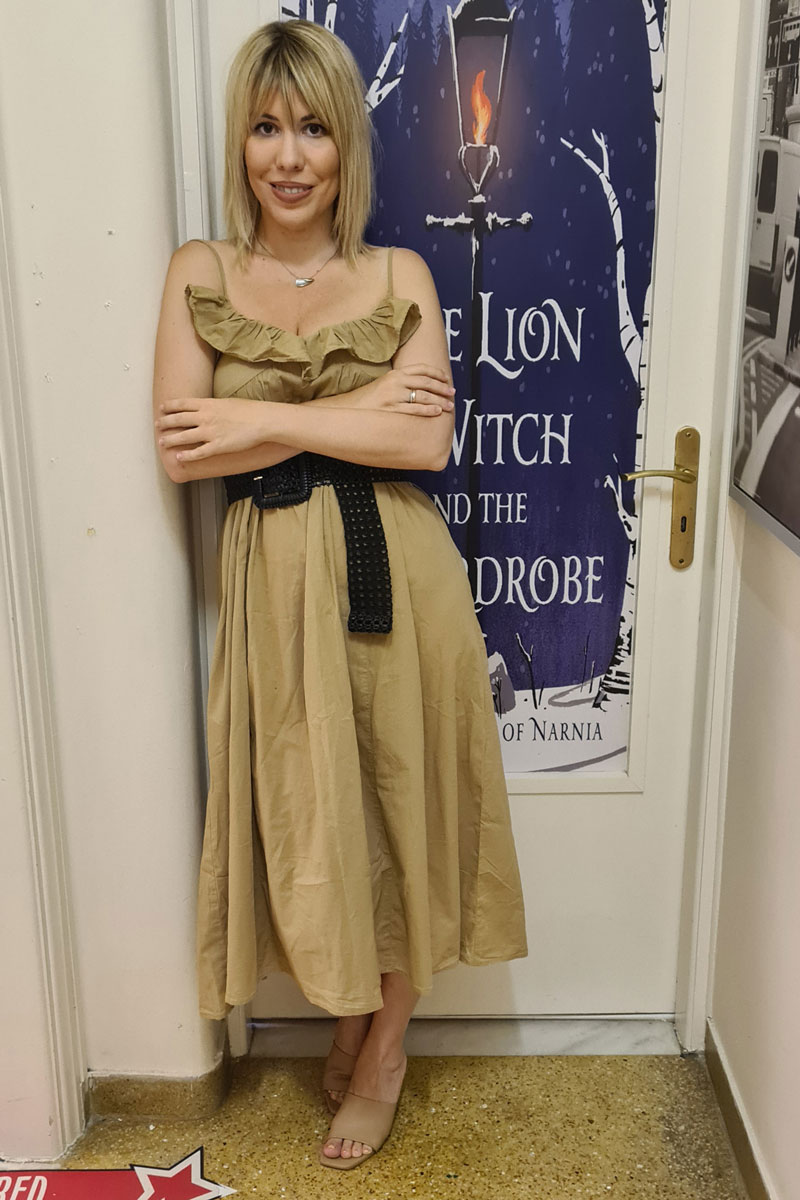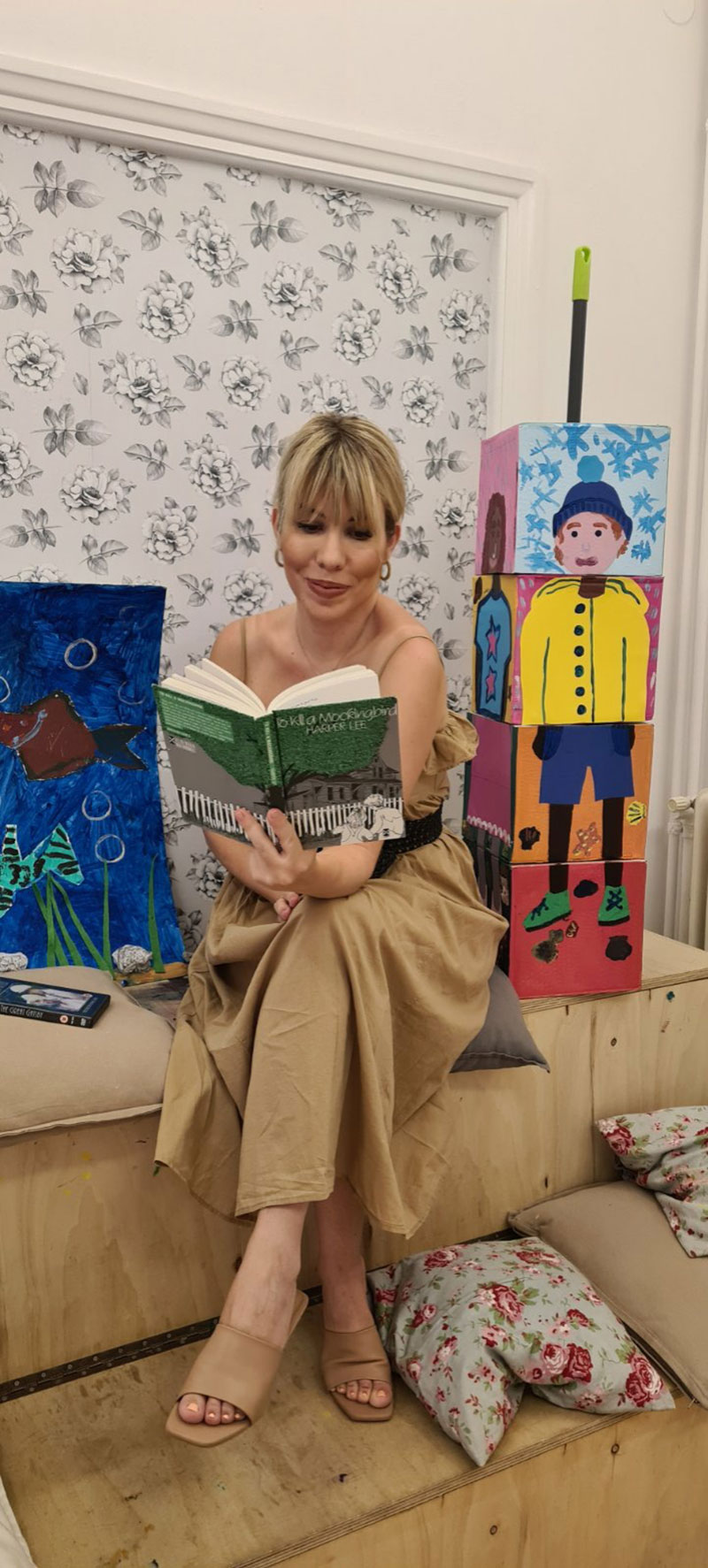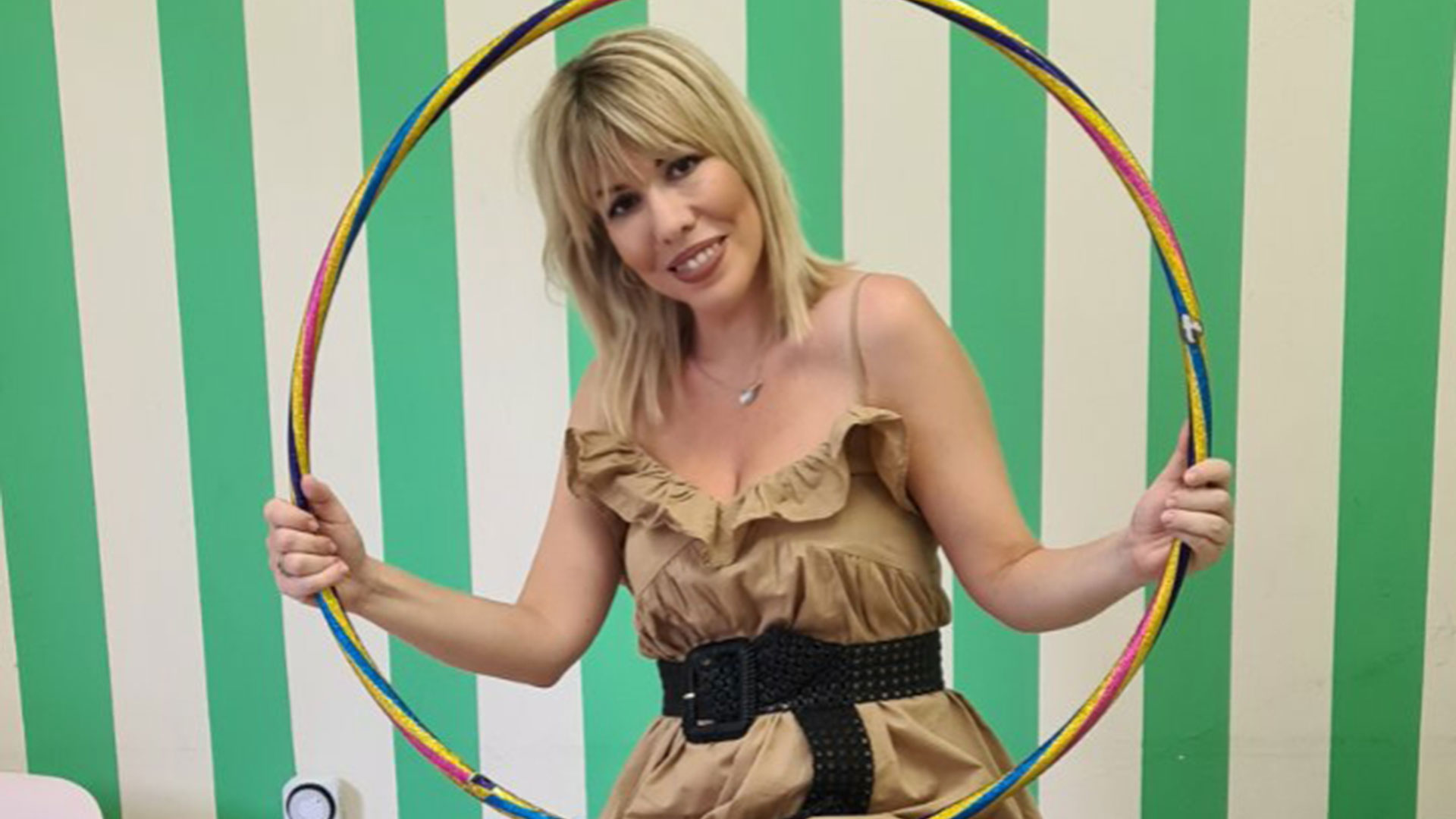Elizabeth Veliou was born and raised in Lamia. She holds a BA in English Language and Literature from the Aristotle University of Thessaloniki and an MA in Cinema Studies from the University of Bristol. After finishing her studies, she came back to Lamia, and started teaching English at a Language School. There, she met Argyris Tzimas, the man, who became her husband. They shared the same vision for a different education, they felt that their town lacked a school that would offer students a holistic language education, so they started their own Language School and also made a lovely family.
Elizabeth was given the 2022 Educator of the Year Award a couple of months ago. The Educator of the Year Award is given annually to a teacher in recognition of sustained outstanding teaching including instilling intellectual curiosity in students, stimulating learning through teaching, encouraging problem-solving techniques by helping students to critically think through issues, solve problems and/or make decisions bringing in real-world case studies into the classroom.
What motivated you to become a teacher?
The teachers I had and the education I was provided with. As a child, I felt that school was a chaotic place for me. I felt trapped, I didn’t feel that formal education offered me something of any value and I was looking forward to ending with it so as to start my real life. I hated school but I loved learning on the other hand. I started reading literature at the age of 6 and writing my own poems and short stories at the age of 8. I knew all about history and mythology from the things my parents had taught me and our family travelling experiences. All my learning before University was purely experiential. When it comes to English, the story is almost the same. We had been travelling abroad since I was 3 years old, I have been listening to English songs and watching English films all my life, writing stories and poems in English, and I have never really studied hard to learn the language through rules and grammar exercises. So, my motivation was my life experience. I wanted to be the teacher that I never had. The teacher who teaches through stories and experiences. The teacher who promotes individual skills and talents. The teacher who cares about the student and not about the syllabus. The teacher who instills a love for learning and not only instructs useless googlable information.
What is teaching? Is it just instilling some kind of knowledge in students?
Teaching is a work of heart. As I have always said, teaching is an act of kindness, an act of love but also a political act. Everyone can instill some kind of knowledge but it takes special skills to make a difference in the life of the students. Education can change mentalities. It is our duty as teachers to make sure that future generations will not repeat their parents’ mistakes, will be much more open-minded, tolerant towards the different, and fight against any kind of injustice. For example, it is not enough to teach historical knowledge if we do not make sure that historical awareness is achieved. This can only be done through project-based learning, the promotion of critical thinking and research skills, and cooperation between students. All these are skills and teaching methods that, unfortunately, the traditional education system does not include in the learning procedure.
Knowing the subject matter is important and many teachers believe that it’s enough to start a career. Is it teaching what it used to be?
I have seen teachers who know how to speak and write in English, who know all the grammar rules by heart, but still, they cannot teach properly. This is because they are not aware of the teaching methodologies, the new trends, and what works and doesn’t work for today’s students. Language education has been changing constantly and we have to keep up if we want to do our job properly. I carried out research for an international conference and it was quite surprising to see that almost 50% of teachers in Greece still use grammar-translation practices when teaching English. On the other hand, you have to be a good language model when teaching the language. So being a good teacher is a combination of things. It takes dedication, thorough knowledge of the subject matter, and continuous professional development.
We are talking about learner-centered and teacher-centered classrooms. Is the difference clear to the teachers?
Classrooms in Greece are mainly teacher-centered. Most teachers think that a learner-centered classroom is a classroom where students have the chance to speak more. However, there is much more to that in order to name a classroom learner-based and it all starts with the teacher. Teachers must become comfortable with changing their leadership style from directive to consultative. Students have a say when it comes to planning their lessons, choosing the content, and even their assessment. If we want to talk about a real learner-centered classroom, we have to accept the fact that students know better which learning experiences work for them, we have to give up our constant need for control and let students lead.
 We know that digital tools can be used to undertake traditional classroom tasks in a more efficient manner, but do such tools truly transform learning and teaching as it is so often suggested?
We know that digital tools can be used to undertake traditional classroom tasks in a more efficient manner, but do such tools truly transform learning and teaching as it is so often suggested?
To be honest, we did not use to be a very tech-friendly school. That had to change during the lockdown. Technology has transformed our lessons greatly and has helped us evolve as educators too. When we came back to our classrooms this knowledge was there and took advantage of it to level up our lessons. However, a walk around the neighborhood, making art, some realia, and random objects for a story in a bag activity has a special kind of magic that cannot be substituted by any kind of app if you ask me. When all senses are involved, learning can become an amazing experience.
Can a more personalized, social-based learning experience be improved by the use of digital tools?
Certain digital education tools have surely encouraged collaboration and facilitated communication between teachers and students and between learners as well. Edmodo is an educational tool that connects teachers and students, similar to a social network, and has facilitated communication a lot during the covid era. TED-ed platform is a great tool as well. Storybird aims to promote writing and reading skills in students through storytelling and Kahoot is also a very popular educational platform based on games and questions. Generally, educators can take advantage of digital tools to create learning experiences.
You are, I dare say, an unconventional teacher almost an ‘anarchist’. Is it a battle you win or you, sometimes, lose?
I am more of an educator than a businesswoman and that has been the most difficult battle that I have to fight every day. When I opened the House of English, I promised myself certain things. I said that I wouldn’t do any intensive summer classes, I wouldn’t do two levels in a year, I wouldn’t teach to the test just for students to pass the exam, I wouldn’t do anything that would harm students at any level. I also promised myself that I would promote diversity, teach much more than just the language and the moment that I would have to compromise my beliefs for what the parents want, would be the moment that I would close my school and end my teaching career in this country. If all of these make me an ‘anarchist’ so be it. I always tell the truth to the parents of my students; I always speak as an educator and not as a businesswoman. I actually express my opinion publicly on social media on matters of education all the time. I have no hidden agendas. If losing the battle means students do not choose us for their education, so be it as well. I have a clear conscience and I know that our school is what is best for their children. My husband has always been the voice of reason telling me “You cannot save everyone’s children” and I have come to accept that. So, as time goes by, I have come to choose my battles wisely.
You started your own FL school in Lamia. How receptive was the local community to your ideas?
Never in our wildest dreams, had we imagined that our school would become so successful. We started with 60 students in 2014 and we are counting more than 300 in our 9th year of operation. We could have had even more students but we decided to work only with people we see eye to eye. We want to cooperate with families that respect our beliefs for a different kind of education, respect our staff, and with whom we have a common vision. We have students coming from all over the area, some driving more than half an hour to reach us! We also have online groups with students from all over Greece, students from Katerini, Thessaloniki, Argos, and Rhodes, and we are extremely grateful that those people chose us for their children’s education!
At some point, there were certain people who came to us just because it was fashionable or because their friends came to us. That was quite difficult to handle because those people were completely unfamiliar with our philosophy. They were truly supporters of the conventional education system who happened to enrol in our school by chance. Luckily, we ended cooperation with those parents quite soon, before they become toxic to our school environment. It is very important to create your audience, the people who choose you for all the right reasons and trust you as the expert that you are. I feel very happy and truly grateful that I am surrounded by a large group of kind, open-minded, caring parents who really want the best for their children.
Was there a resistance or a ‘war’?
 Before I opened my school, I worked in other language schools and also did private lessons. I did everything my way though. There was a time I asked for materials to do projects and my former employer said that it cost too much money so I paid for everything on my own and we worked wonders with my students. There were many things I wanted to do but I had to have my own school to do them. In my private lessons, we did projects as well, watched and analyzed films, talked about literature, and wrote stories together. The families I cooperated with had no problem with that because they knew that this is how I worked. However, nothing can beat the magic of the classroom and even the best teacher cannot do their best when working with only one student. You need communication, and collaboration, you need the beauty of the creative noise that makes learning happen when teaching a foreign language. When I opened my school all my students followed me. They brought their friends too, and our little education revolution started. We’ve heard a lot of nuisances since then. That communicative language teaching and experiential learning do not lead to passing the exams. That we are too lenient and democratic for letting students move around the classroom and giving them a voice. That without strict grammar teaching you cannot expect someone to learn a foreign language. That projects and presentations are useless and we should only concentrate on passing the exam. The people who say those things are either ignorant or just too bored to study anything about language education. They have found the most convenient way for them, the easier and most effortless one, and chose not to see any further. They focus on testing, they focus on teaching the lesson, but they don’t focus on the student. They don’t focus on learning.
Before I opened my school, I worked in other language schools and also did private lessons. I did everything my way though. There was a time I asked for materials to do projects and my former employer said that it cost too much money so I paid for everything on my own and we worked wonders with my students. There were many things I wanted to do but I had to have my own school to do them. In my private lessons, we did projects as well, watched and analyzed films, talked about literature, and wrote stories together. The families I cooperated with had no problem with that because they knew that this is how I worked. However, nothing can beat the magic of the classroom and even the best teacher cannot do their best when working with only one student. You need communication, and collaboration, you need the beauty of the creative noise that makes learning happen when teaching a foreign language. When I opened my school all my students followed me. They brought their friends too, and our little education revolution started. We’ve heard a lot of nuisances since then. That communicative language teaching and experiential learning do not lead to passing the exams. That we are too lenient and democratic for letting students move around the classroom and giving them a voice. That without strict grammar teaching you cannot expect someone to learn a foreign language. That projects and presentations are useless and we should only concentrate on passing the exam. The people who say those things are either ignorant or just too bored to study anything about language education. They have found the most convenient way for them, the easier and most effortless one, and chose not to see any further. They focus on testing, they focus on teaching the lesson, but they don’t focus on the student. They don’t focus on learning.
How easy is it to change people’s mindsets?
There are two groups of people who have to change mindsets when it comes to education –teachers, and parents. Teachers are the ones who have to change first, so as to educate parents. If all teachers focus on learning, as I said above, if all teachers really care about what is best for the student, if they study neuroscience and all the current research on language education and methodologies, they will find out that conventional practices don’t work. If teachers become experts and realize that teaching the language holistically is the only way of actually giving students the chance to evolve as language learners, then parents will understand it as well. If teachers stop grading the traditional way and start giving student reports with “can do statements”, then parents will start understanding the CEFR and how it works. There is still a clash of mentalities in the field and if this does not change any time soon, I am afraid that there will be a huge crisis in foreign language education, and the big loser is going to be the student. Luckily, I have the honour to call my friends some of the best educators in Greece and pioneers in the field of ELT. So, I have seen what it is to have so many gifted teachers gathered together and I believe that if we actually go for that change, great things can happen.
You’ve been in the ELT scene for many years. What advice would you give to novice teachers?
There are three things I would say to all new teachers out there:
- Be a constant learner. Be hungry. There is always something new to learn in this field. Stay hungry and stay humble as well. You can’t get from 0 to 100 overnight. Take baby steps, know your limits, and eventually, let your success be your noise.
- Give students a voice. Respect them before you ask for respect. Say sorry, ask for their opinion, and don’t demand them to ask you for permission to do things. Don’t set the rules. Ask them to do it as a team. You will be surprised at the things you will succeed in if you let your students lead.
- Do not depend on the coursebook. The coursebook is just a tool. Create your own material. Use Art, Music, Films, and everyday objects, share your personal stories and make your lessons memorable and meaningful. If you don’t finish the book, it’s OK. You did other things instead. Focus on learning. This is what matters.
